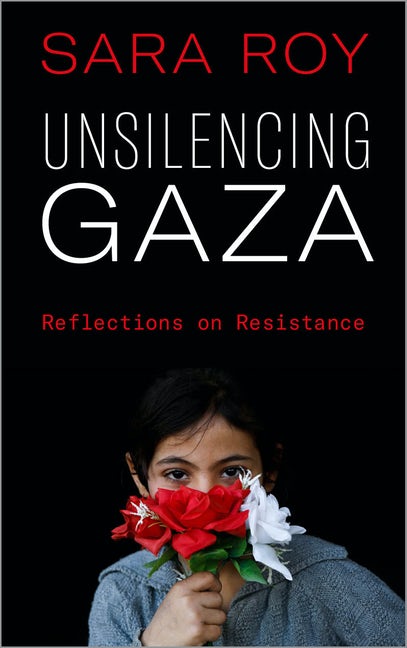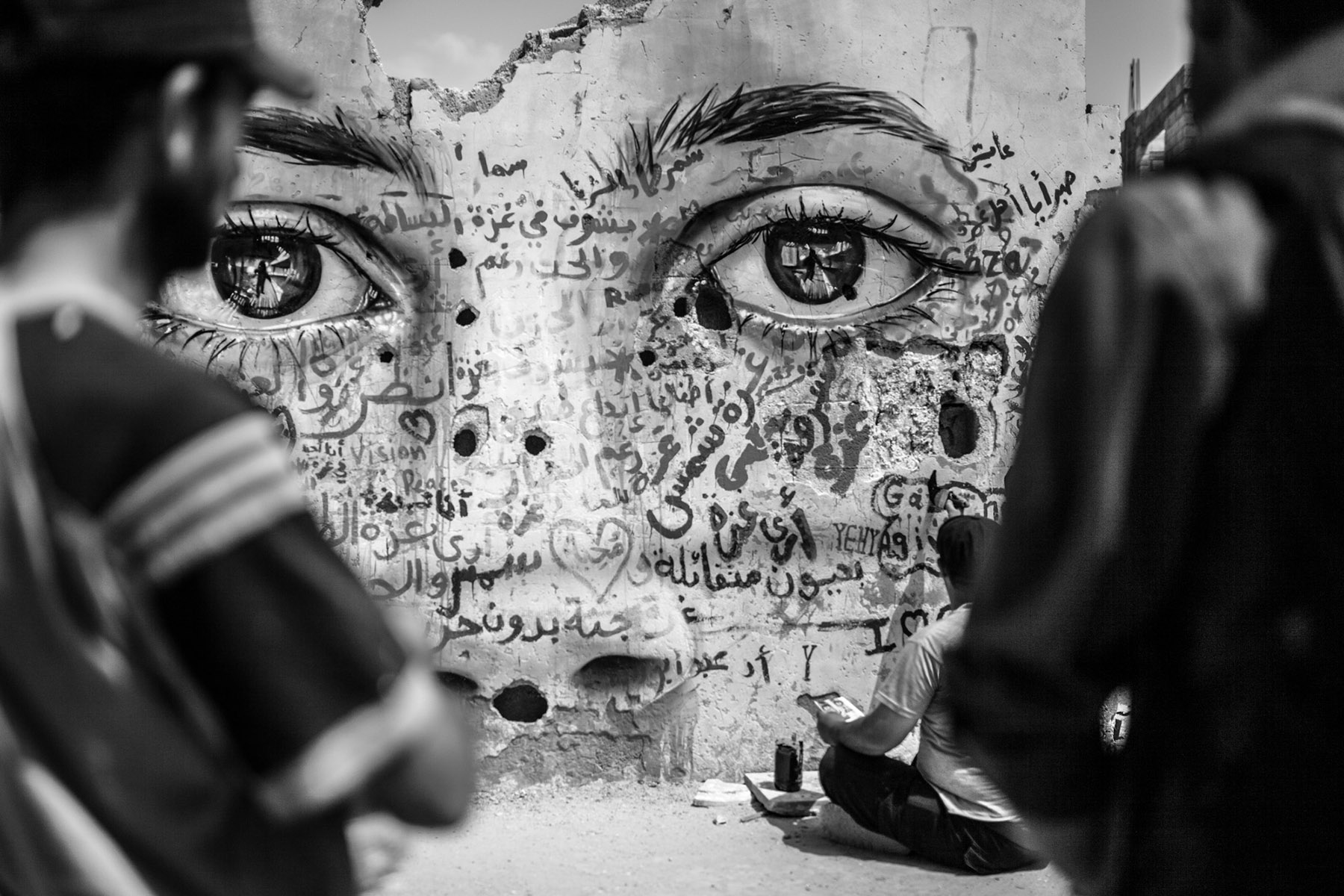In which the writers underscore how Gaza represents a new kind of dystopic reality on the ground.
Ivar Ekeland and Sara Roy
A new kind of politics is emerging in Western democracies, perhaps best characterized by fragmentation. The political debate is increasingly digital, visual, and incoherent—without structure or boundaries—and therefore transitory and ephemeral. The historian Martin Conway argues1 that the longstanding political contract between the citizen—who voted, obeyed laws, paid taxes etc. — and the state—which provided a range of social goods and services in exchange — is retreating and with it, what it means to be politically represented, what it means to be a citizen. Because the state provides less, the citizen feels diminishing obligation towards it. The resulting crisis of legitimacy has given rise to a kind of individualized decision-making among citizens who want “control of their local neighborhood and their national society, but also the control to decide what they want for themselves, rather than what others — a government, for example — might deem to be good for them.”2
This raises an interesting question: how do you control a population, which does not want to be controlled? What becomes of politics when democratic norms and ideological aspirations disappear? The answer is that as rules and norms recede, the exceptions become the new rules and determine the new norms. Gaza is a laboratory where they are being tested.
Since Aristotle, politics had been understood as a conversation between people who happen to share a common territory and who try to figure out the best way to live together. Today, this common ground is eroding; the fact that people share a territory is no longer considered a strong enough basis for sharing the future. This observation was powerfully made by Hannah Arendt. In The Perplexities of the Rights of Man, she argues that the fundamental deprivation of human rights is expressed first and most powerfully in “the deprivation of a place in the world which makes opinions significant and actions effective. Something much more fundamental than freedom and justice, which are rights of citizens, is at stake when belonging to the community into which one is born is no longer a matter of course and not belonging no longer a matter of choice…This extremity and nothing else,” she writes, “is the situation of people deprived of human rights. They are deprived not of the right to freedom but of the right to action; not of the right to think whatever they please, but of the right to opinion.”3 So placed, Arendt says, people are “forced to live outside the common world . . . without a profession, without a citizenship, without an opinion, without a deed by which to identify and specify [themselves].”4 She was spurred by the plight of European refugees in WWII, but now there is Gaza.

Strategizing Exception: Gaza
Why Gaza? An area that is just 140 square miles in size, largely devoid of resources such as land, water and electricity, home to a ruined, dysfunctional economy (with no industrial base to speak of) and more than two million people—over half are children and most are refugees—with high rates of unemployment and poverty, overwhelmingly dependent on humanitarian assistance, almost entirely imprisoned within a militarized fence, and under permanent surveillance from the air.
Yet, Gaza’s small size, its misery, and continued vulnerability belie its profound significance, which has always been misunderstood and overlooked—except by Israel. Why did Israel choose to make Gaza exceptional and how did it do so?
From the beginning of the occupation, Israel has not known what to do with Gaza. Historically, the center of Palestinian nationalism and resistance to occupation, Gaza has, despite periods of quiet, remained defiant and rejected Israeli rule. For Israel, the turning point in its treatment of Gaza occurred during the first Intifada, which changed how Israel viewed Palestinians (and how Palestinians viewed themselves). It was then, particularly in the early years of the uprising, that certain unprecedented dynamics emerged. For one, Palestinians demonstrated that they could organize and act as a collective, maintaining discipline and cohesion at the local level and beyond.
They articulated clear demands, insisting on a political solution that involved compromise of the kind Israel had always refused to make. Furthermore, Palestinians successfully shifted the political reference point from the historical debate on Israel to a state of their own co-existing with Israel. And for a time, albeit brief, Palestinians acted as a national group, forcing Israel to engage diplomatically and on terms that were not solely its own. Palestinians showed that they could articulate their own history, a history from which the state of Israel was not freed.5
In this way, the Intifada confronted Israel with a new reality where Palestinians were seeking engagement on terms of greater equality and in ways that contradicted Israel’s long-held understandings and political imperatives. However, this engagement did not occur. Instead, Israel realized that it must never adapt to Palestinians or their nationalist demands but must repudiate both by narrowing their vision and diminishing their capacity—attacking what makes Palestinians present and irreducible. Palestinian existence became a provocation to the state. For Israel, the solution was found in making Palestinians vanish in a political no-man’s-land created for that purpose. The present situation is without historical precedent, and therefore, by its very definition, is a state of exception. Gaza is a laboratory where Israel is experimenting with new rules and new norms, and it is our contention that as our democracies evolve towards states of exception they will look with favor to the Gaza experiment.
The first step towards creating this state of exception was the dismemberment of Palestine under the Oslo Agreements. “Under Oslo, the historical contest over territory was reframed by a policy of separation, isolation, and containment. Within this framework Gaza and the West Bank were separated demographically and physically. As a result, an isolated Gaza came to be seen as exceptional or marginal,”6 excised from a Palestinian state and a Palestinian nation. Gaza’s exceptional status became a defining dynamic of Israel’s more crucial goal of annexing large parts of the West Bank, and the template for the fragmentation of the West Bank into small, disconnected enclaves under different and constant forms of assault. Here, too, Israeli policy speaks to something apart. Colonial powers would recognize the oppressed as indigenous or natives meaning they belong to the land even if the land no longer belongs to them. Not so with Israel which aims to eradicate, or at the very least, render invisible the presence of Palestinians. This is as true in the West Bank with the expansion and encroachment of Israeli settlements and settlement infrastructure, as it is in Gaza.
Annulling Gaza’s place in Palestine and rendering Palestinians rightless has been achieved through several Israeli policies. Perhaps the most striking is the transformation of Palestinians in Gaza from a people with political, economic, and national rights into a weakened community dependent on humanitarian assistance. A senior official at the Israeli human rights organization, GISHA, distilled Israel’s approach to Gaza: “In the rest of the world we try to bring people up to the humanitarian standard. Gaza is the only place where we’re trying to push them down—to keep them at the lowest possible indicators.”7 In this way humanitarian aid is used not only to meet the rapidly expanding needs of an increasingly impoverished population (primarily due to Israel’s intensified military closure of Gaza, now in its 15th year), but is also used to prolong conflict and suffering. Israel creates and maintains a humanitarian problem to contain a political one. At best, political justice is replaced by compassion (as Eyal Weizman has written8), at worst, by ruination. In this way, humanitarianism itself becomes a form of violence against the people it is meant to assist.
In the most recent attack on Gaza in May 2021, Israel completely or partially destroyed—as it has in previous assaults—some of Gaza’s infrastructure including homes, schools, health facilities, businesses, factories, roads, and government offices. Also destroyed was one of Gaza’s largest stores of pesticides and fertilizer—specifically 259 tons of pesticides and 1,758 tons of fertilizer (in addition to 9,312 tons of seeds).9 Yet, the objective of this targeted destruction far exceeds any one sector—notably, agriculture. The deliberate release of carcinogenic chemicals into the environment in this way (in addition to the toxins introduced by the bombs and other munitions dropped on Gaza) ensures their infiltration into soil and groundwater and, by extension, into a food supply that is not only diminished but increasingly noxious. This speaks not only to lethality but, over time, to deformity and perhaps, infertility.
Hence, Gaza is not only isolated but also made irrelevant and useless; human life is wholly vulnerable without, in effect, any legal or juridical status, recourse, or appeal, which is exactly what is meant by a state of exception. The lack of recourse also exists within the international community where Israel has managed to delegitimize the Palestinian narrative, and remains removed from the violence it creates. In this state of exception, Gazans are stripped of culture and accomplishment, rendered “unnameable” except for their biological needs, where, to repeat Arendt’s words, they are forced to live outside the common world, denied place and belonging and all that attends it; even their Facebook and Twitter posts are censored.
Israel has created a parenthetical reality for Gaza, which is expressed in the destruction of the ordinary (or that which binds societies together): the undoing of shelter and livelihood, in social space that is never insulated from violence, where violent excess is normal and made intimate, and in policy that regards “peace” as an instrument of oppression.
Gaza’s erasure finds another expression in Israeli policy, which insists on a kind of clarity that will silence any empathy that might arise. For Israel everyone in Gaza is Hamas and therefore a legitimate target—children, women, men, families, even the dead and buried. There are no innocents or blameless in Gaza, no fathers or mothers, sisters or brothers, daughters or sons. There are no homes or schools, no museums or universities, no libraries or health clinics, no parks or playgrounds. Instead, say Israeli officials, there is only grass, which must be mowed from time to time.10
Some Concluding Thoughts
Gaza has been removed from the sphere of politics. Relief is the only choice left.
Gaza is an experiment where policy is used to exclude and technology is used to control. In these obscene spaces new weapons and new means of surveillance are continuously being tested, to the great benefit of Israeli industry. But the drones used for surveillance and killing or the indetectable spying software—the latest instance of which is Pegasus—are far from being the most terrifying exports from Israel: they pale before the automated decision system that is built into them.
Decisions which used to be made by humans are now handed out to algorithms, and agonizing moral dilemmas have been turned into crude mathematical formulas.11 How many members of a group should be killed to render the group ineffective? The answer is 25 percent.12 How many bystanders is it acceptable to kill when targeting a “high-worth individual”? During the Iraq war, the threshold was 2913 and any number less than 29 was acceptable; at 30 or more, approval was needed from Rumsfeld or Bush.
In this way moral dilemmas are translated into a grotesque accounting system, defined as “humanitarian”. At its core this new ethics speak to a normality that is immoral and inhumane, that aim to invalidate and remove all sites of encounter with the other, where sympathy cannot be elicited or attachments forged—where tragedy and poetry do not exist.
Politics and ethics are therefore reduced to economics: everything has a price, including acts of resistance. If the price is high enough, people—in this case, Palestinians—will find it irrational to indulge in such acts. If they persist, the price was too low and needs to be increased until the right level of fear and pain are attained. Ethics become a problem of optimization: Gazans must be kept quiet at a minimal cost in lives and destruction. Finding the right balance between killing too many (which will cause moral outrage among some) and too few (which would not instill the right degree of terror) presents interesting mathematical problems, very similar to ones raised in economic theory.
Gaza, of course, is an extreme case, but there are similar situations developing around the world, other places of inattention and formlessness. In the US, for example, making America great again still goes hand in hand with sending people from “shithole countries” back to where they will remain unseen. Similarly, millions are kept in refugee camps in Turkey, Libya, or Europe itself with very little prospect of leaving or earning a living. Families are kept for years in camps, caught between the hope of an improbable asylum in Europe and the fear of being sent back. They are increasingly seen as a nuisance to be contained and isolated rather than welcomed and integrated. They are the European versions of Gaza—without the bombing. The French government, which long insisted on the integration of refugees and their transformation into French citizens, is now engaged in a campaign against its Muslim population, singled out for “separatism” while Parliament has passed laws “to fight radical Islamism”. Social problems, which arise from poverty and discrimination, are thus described in terms of religion and nationhood and treated as terrorism. And woe to sociologists, economists, or historians who try to reframe the problem according to their own expertise: the French minister for higher education has called for an inquest into “Islamo- leftists” in academia, in line with former prime minister Valls, who is on record for claiming that “trying to understand is a step towards trying to excuse”.
For growing numbers of human beings, the new politics is simply about removing the other from sight. As a policy, the excluded may not be killed but are owed nothing—no land, no income, no protection, and certainly no place or home—except mere food and water, what Agamben calls “bare life”. And for every human being set apart and denied, there is another for whom that separation and denial are defining. Exclusion and identity politics are opposite sides of the same coin. You are an Israeli Jew if you are not a Palestinian; you are a French republican if you are not an observant Muslim. You are an American if you are not a Guatemalan immigrant seeking US citizenship.
Mini-Gazas are developing around the world. From Gaza to Lesbos, from Lesbos to Afghanistan and beyond, sites of exception are growing where people are barred from legitimate political discourse, unrecognized but kept alive, without claim to community or nationhood—declared unfit, without a past and hidden from history, and consigned to abstraction. They exist confined and worldless, without attachment, purpose, or function, where the principal aim of politics is to control unwanted populations with no vision of anything but further control. It is a politics designed not to find solutions or even imagine what they might look like—an approach that is considered supportable, allowing injustice to settle in. Hence it is not surprising that the developed world is no longer thinking in terms of a mutual destiny, which bodes ill for the global challenges facing humanity such as climate change and the pandemics yet to come. Collective action will be needed to prevent the worst outcomes that await us, but in a world where global politics is increasingly defined by exclusionary nationalism and the absence of vision and compassion, such action seems more and more unlikely.
One day the Gazas will defeat us.
Endnotes
1. Martin Conway, “Making Trump History,” org, February 25, 2021, online: https://issforum.org/to/ps2021-9.
2. Ibid.
3. Peter Baehr (ed.), The Portable Hannah Arendt (New York: Penguin, 2003), p. 37.
4. Hannah Arendt, The Origins of Totalitarianism (New York: Harcourt Brace, 1951), 302.
5. See Sara Roy, Unsilencing Gaza: Reflections on Resistance (London: Pluto Books, 2021), 201-202. Some of the points raised here are explained in greater detail in this book.
6. Roy (2021), pp. 209-210.
7. Roy (2021), pp. 78-79.
8. See Eyal Weizman, The Least of All Possible Evils: Humanitarian Violence from Arendt to Gaza (London: Verso, 2011).
9. Presentation by Dr. Wesam Al Madhoun, “Impacts Assessment of the Gaza War 2021: A Vision Towards a Sustainable Reconstruction,” International Webinar on Launching the Report, The Policy Times, July 1, 2021.
10. See, for example, Adam Taylor, “With Strikes Targeting Rockets and Tunnels, the Israeli Tactic of ‘Mowing the Grass’ Returns to Gaza,” Washington Post, May 14, 2021.
11. See Derek Gregory, “From a view to a kill: drones and late modern war,” Theory, Culture and Society, vol. 28, n°7-8 (2011), p. 208; and Gregoire Chamayou, A Theory of the Drone ( New York, NY: The New Press, 2015).
12. Weizman (2011), p. 14. Quoted from an interview with General Itzhak Ben Israel in the movie, The Lab.
13. Weizman (2011), p. 132.





